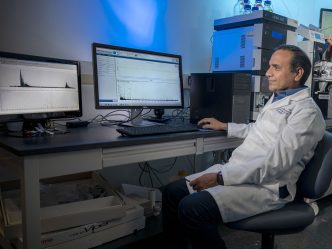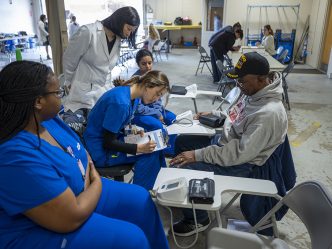Researchers at The Dental College of Georgia at Augusta University are conducting a clinical study of the effects of vitamin D on periodontal disease and healing after treatment.
The study, being done in collaboration between the DCG and the Georgia Prevention Institute, will include 24 subjects with dark skin previously diagnosed with moderate to severe periodontal disease who also have tested as vitamin D deficient or insufficient.
Subjects will be randomly assigned to one of two study groups for the four-month trial: one group receives a vitamin D supplement while the other group takes a placebo. At the half-way point, any improvement of the subject’s periodontal disease is recorded before receiving a deep-cleaning. At the end of another two months of vitamin D supplementation, researchers measure impact on healing after the treatment.
“The two populations where you see vitamin D deficiency most often are those with dark skin and those who live in northern climates,” said Dr. Cristiano Susin, director, Clinical Research. “In this area, African-Americans and other ethnic groups with darker skin are at a higher risk to be vitamin D deficient due to their skin color.”
Known as the sunshine vitamin, vitamin D is produced by the body in response to skin being exposed to sunlight. Because melanin acts like a sunblock, dark-skinned individuals, in particular, may require extra vitamin D to avoid deficiency, especially at higher latitudes.
“Vitamin D is essential to having a healthy immune system as every cell expresses the vitamin D receptor, which means it needs vitamin D to function properly,” said Dr. Mark Peacock, an associate professor in the Department of Periodontics at The Dental College of Georgia and one of the researchers conducting the study. “Those with periodontal disease often are deficient or insufficient in vitamin D.”
Vitamin D deficiency and insufficiency is a public health problem because of the many medical problems associated with low levels of the vitamin, including cardiovascular disease, inflammation, cognitive impairment, cancer, bone density conditions and type 2 diabetes. Vitamin D is essential for strong bones, because it helps the body use calcium from the diet. Insufficient levels of vitamin D contribute to periodontal disease by increasing inflammation and by weakening the bone density needed to support healthy teeth and gums.
Subjects for this study are still being enrolled. They are required to make seven visits to the DCG over the four-month study and are reimbursed for travel expenses. The data collected through this study will be used to submit a grant to the National Institutes of Health or the American Heart Association.
Co-investigators on this study include: Drs. Christopher Cutler and Yanbin Dong, co-principal investigators; Drs. Roger Arce, Mark Peacock, and Cristiano Susin, and, two DCG periodontics residents, Drs. Lance Hutchens and Daniel Shelby.
 Augusta University
Augusta University





